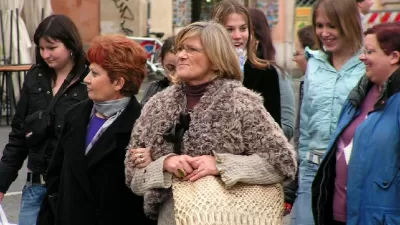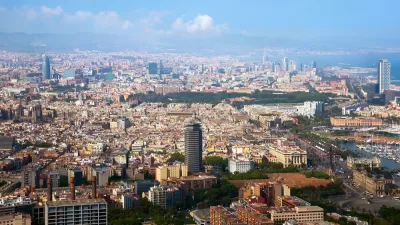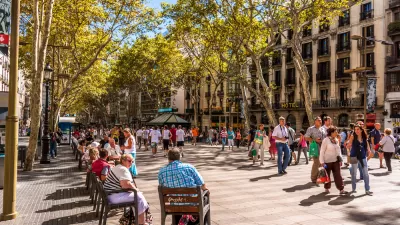Mayor Ada Colau announced the next step in Barcelona's plan to convert the city center into a "new city for the present and the future."

In Barcelona, plans have been announced to create a 21-street vehicle-restricted 'superblock' in the Eixample district of the Catalan capital. The plan, announced by Barcelona Mayor Ada Colau is part of a larger vision to transform the city's central grid into a pedestrian-first network of tree-filled, car-free blocks and plazas.
Feargus O'Sullivan's article shares details from Mayor Ada Colau's announcement: "These squares and streets will be planted with trees that will shade 6.6 hectares (16 acres) of new green space when mature, in a zone that will contain an extra 33.4 hectares of pedestrian space. With work beginning in 2022 to a budget of 38 million euros ($45 million), the plan represents one of the most thorough revamps of a major European city so far this century."
Proponents of the plan brace for resistance from motorists who have protested similar plans that included restrictions on motor-vehicles. The city also anticipates "the project will probably prove more difficult to implement than those installed in quieter areas. While bustling parts of the city have been given the superblock treatment before — the current plan will extend from a smaller existing superblock around the Sant Antoni covered market — they have never extended for as great a distance as the new zone," writes O'Sullivan.
Barcelona officials will hold a competition in May 2021 to decide the design of the Barcelona Superblock. O'Sullivan's article lays out the specific requirements for designs submitted to the competition, including 80% of street shaded by trees in the summertime and 20% permeable surfaces on streets.
FULL STORY: Barcelona Will Supersize its Car-Free ‘Superblocks’

Planetizen Federal Action Tracker
A weekly monitor of how Trump’s orders and actions are impacting planners and planning in America.

Maui's Vacation Rental Debate Turns Ugly
Verbal attacks, misinformation campaigns and fistfights plague a high-stakes debate to convert thousands of vacation rentals into long-term housing.

San Francisco Suspends Traffic Calming Amidst Record Deaths
Citing “a challenging fiscal landscape,” the city will cease the program on the heels of 42 traffic deaths, including 24 pedestrians.

Defunct Pittsburgh Power Plant to Become Residential Tower
A decommissioned steam heat plant will be redeveloped into almost 100 affordable housing units.

Trump Prompts Restructuring of Transportation Research Board in “Unprecedented Overreach”
The TRB has eliminated more than half of its committees including those focused on climate, equity, and cities.

Amtrak Rolls Out New Orleans to Alabama “Mardi Gras” Train
The new service will operate morning and evening departures between Mobile and New Orleans.
Urban Design for Planners 1: Software Tools
This six-course series explores essential urban design concepts using open source software and equips planners with the tools they need to participate fully in the urban design process.
Planning for Universal Design
Learn the tools for implementing Universal Design in planning regulations.
Heyer Gruel & Associates PA
JM Goldson LLC
Custer County Colorado
City of Camden Redevelopment Agency
City of Astoria
Transportation Research & Education Center (TREC) at Portland State University
Jefferson Parish Government
Camden Redevelopment Agency
City of Claremont





























